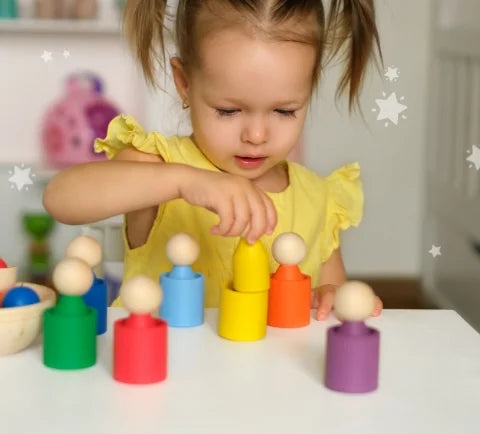What Is Cognitive Play?
For your preschooler, play is more than fun and games: It’s the foundation of their cognitive development. 1 When the floor turns to lava or they’re stacking blocks to build the tallest tower yet, your preschooler isn’t only wonderfully in the moment; they’re also developing cognitive skills like problem solving, memory, and decision-making. 1 With cognitive play , your child’s natural curiosity leads the way as they build a model of their world and develop their thinking skills. 1, 2
Five Ways to Play
Tap into your child’s imagination, curiosity, and thirst for exploration with these five cognitive play ideas.
-
Play with Patterns. Children are drawn to patterns, both discovering and creating them. Pattern play is also a precursor for math. 3 You can engage this desire to recognize and create order by making patterns of any kind, from laying out stuffed animals in an order for your child to repeat, making sounds in a rhythm together, or asking them to show you three specific dance moves to follow and repeat. 2 To get them laughing, ask your preschooler to let you know when you’ve gotten the pattern wrong!
-
Create Anything-Can-Happen Art. While art projects with specific outcomes have their place, there’s cognitive benefit to letting children create whatever they envision! 3 Instead of giving them an exact image to recreate with specific materials, try giving them more options. Encourage them to make their idea of whatever it may be—a house, tree, ball—out of whichever materials call their attention. Following their own vision helps develop creativity as well as planning and other executive function skills. 4
-
Discover the Small Things. If you want an activity that might even keep your little one still for a few minutes (but no promises on that!), help them look more closely into something that already interests them. 3 Try handing them a magnifying glass and, well, anything they can take a closer look at! You might try something natural like a flower, leaf, or orange slice. You can encourage them to marvel at the intricacies of something they encounter every day, like the Velcro on their shoe or their own fingertips.
-
Question Everything Together. When the barrage of why questioning begins, don’t run for cover. Instead, join in! Encourage all these questions, and feel free to ask some of your own. Their questions are the verbal expression of your child’s discovering, grappling mind. 5 Whether you know the answer to their questions or not, you can encourage their discovery by asking questions of your own. Try these: “What do you think?” “Huh. What do we know so far about this?” “How could we figure this out?”
-
“Yes, and…” Their Imaginary World. Just like the key tenet of improv, to say “Yes, and…” to whatever your partner suggests, doing this with your child helps them extend, direct, and more deeply experience their imaginative landscape. 1, 6 Your child says they’re a dog? Yes! And you can be one, too, or maybe you’re the trainer. Now you’re on the moon? Great! Enjoy the lessened gravity and leap into whatever else your little one has in store.
There are so many ways to foster your child’s development, from this handful of cognitive play ideas for preschoolers to nutritional support for their brain. Just as your child uses their imagination and curiosity, you can use these ways to play to invent more activities and, best of all, have fun together in the process.
1. https://files.eric.ed.gov/fulltext/EJ1118552.pdf
2. https://journals.sagepub.com/doi/10.1177/027112148200200305
3. https://www.virtuallabschool.org/preschool/cognitive-development/lesson-5





